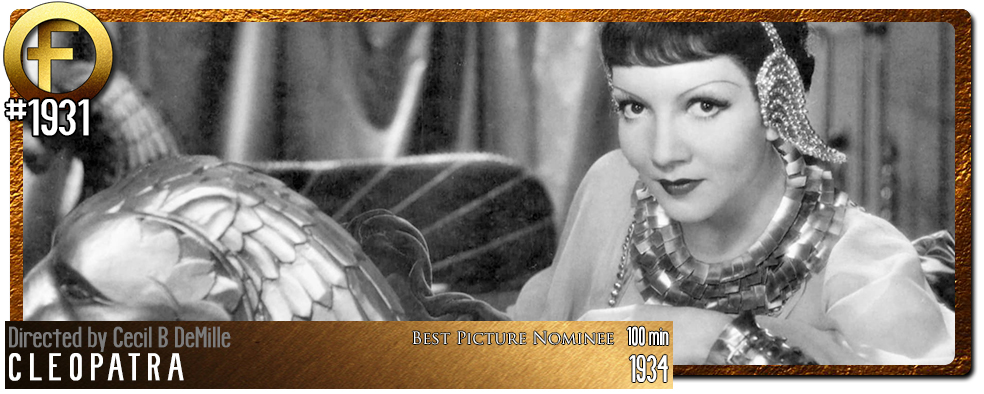Movie Review – Cleopatra (1934)
Principal Cast : Claudette Colbert, Warren William, Henry Wilcoxon, Joseph Schildkraut, Ian Keith, Gertrude Michael, C Aubrey Smith, Irving Pichel, Arthur Hohl, Edwin Maxwell, Ian Maclaren, Eleanor Phelps, Leonard Mudie, Grace Durkin, Ferdinand Gottschalk, Claudia Dell, Harry Beresford, William Farnum, Lionel Barrymore, Florence Roberts, Richard Alexander, Robert Warwick.
Synopsis: The man-hungry Queen of Egypt leads Julius Caesar and Mark Antony astray, amid scenes of DeMillean splendour.
********
Academy Award-winner Claudette Colbert had a defining year in 1934. Not only did she score a Best Actress win for her performance alongside Clark Gable in It Happened One Night, but three of her films that year were nominated for Best Picture – Imitation of Life, It Happened One Night, and this film, Cleopatra, directed by Cecil B DeMille. While the Gable/Colbert combo film would ultimately become the first film to win all Big Five Oscars that year, it shouldn’t be overlooked that Colbert was a major screen star in her own right, with Cleopatra cementing her as an icon of the industry with plenty of flesh, humour and drama. Cleopatra was a solid Oscar contender, and won its only award for Cinematography (more on this later), losing in the four other categories it was nominated for. Described as an “epic”, the film resonates with the lustre and showmanship of Hollywood’s golden age of cinema, with DeMille’s direction and the obvious big-budget spend on sets and costuming going a long way to defining the excess of the period as Colbert, together with co-stars Warren William and Henry Wilcoxon, oozes sex appeal as the infamous Queen of Egypt and one of history’s most enigmatic figures.
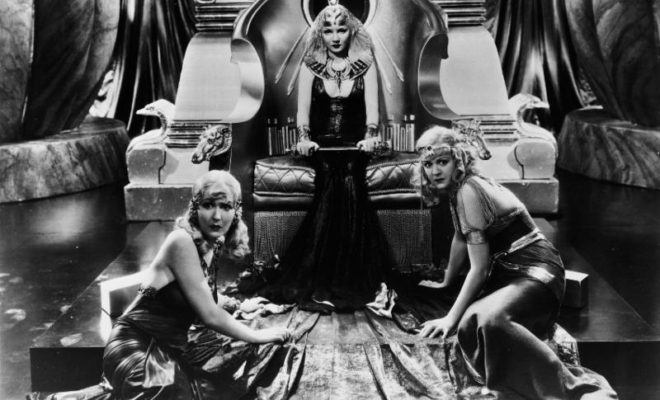
48BC, and Egyptian Queen Cleopatra (Claudette Colbert) fights for control of the country against her brother Ptolemy, who intends to sign a pact with Rome and Julius Caesar (Warren William) for peaceful entry into the Roman Empire. Cleopatra uses her feminine wiles to beguile Caesar, who spends a great deal of time in the Queen’s company. This leads to unrest back in Rome, as discontented politicians sprout false rumours that Caesar has grown soft under the bosom of a foreign queen. When Caesar is murdered by Brutus (Arthur Hohl) and the rest of the virulent Roman Senate upon his return with the Queen in tow, Cleopatra returns to Egypt. Famous woman-hater Marc Antony (Henry Wilcoxon) begrudgingly accepts a mission to travel to Egypt and capture the Queen to placate the baying mob, only to find himself enthralled by her upon their first encounter. Eventually the pair enter into a relationship, which leads Marc Antony’s chief rival, Octavian (Ian Keith) to declare war on Egypt and invade. Marc Antony endeavours to fight against his own countrymen, having fallen in love with Cleopatra, but through mistaken belief of her betrayal kills himself rather than be take prisoner. Upon learning of his death, Cleopatra forces a deadly snake, an asp, to bite her, and she too succumbs to tragic fate.
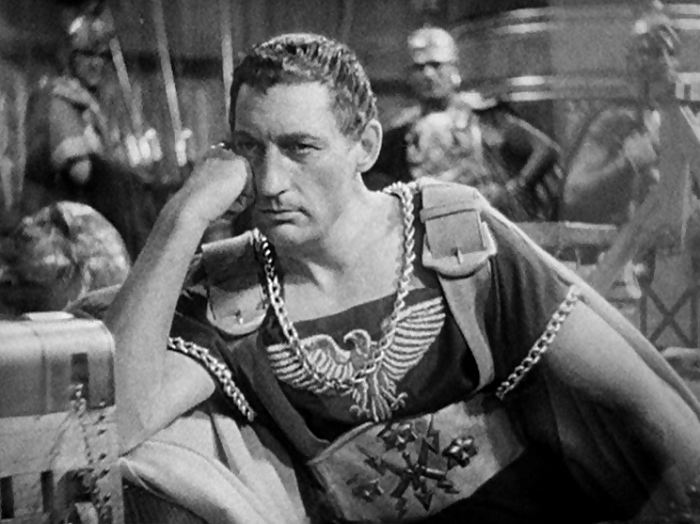
Although not the first feature film to depict the famous Egyptian Queen, DeMille’s Cleopatra is perhaps the best. While Elizabeth Taylor may remain the definitive actress to play the part, Claudette Colbert surely is the sexiest, her impish coquette features and overt guile a far cry from the more formidable Taylor (or various other actresses to don the famous headdress and mascara) and DeMille’s comparatively brief film a spartan-like epic quite captivating in its simplicity. The film lacks depth, sure, as it playfully delves into the salaciousness of Cleopatra’s relationship with both Caesar and Marc Antony, but it taps into the well-known story points with ease and gives us a lead actress performance for the ages. Written by Waldemar Young and Vincent Lawrence, based off historical material by long-time DeMille associate Bartlett Cormack, Cleopatra sets up its political climate quickly, introduces its cast with little fanfare, and sets about parlaying the production’s expansive (and admittedly impressive) sets into an engaging, if somewhat stilted, dramatic narrative.

Leading the cast is, of course, Claudette Colbert, and while I didn’t enjoy her performance in It Happened One Night, in Cleopatra she’s a revelation. Sexy, sultry, manipulative, and occasionally shrill, Colbert manifests the perfect screen portrayal of Cleopatra with her enormous doe-eyes and sheer Egyptian costuming, prickling the skin with feminine luxuriousness alongside a devastating emotional performance. At times I was unsure if she was honest in her protestations and devotions or simply manipulating the men who came for her (I like to think the former, because Cleopatra was nobody’s bitch, and a total badass) and Colbert’s look, manner and skill with the camera are superb. Hell, who wouldn’t fall in love with the foxy young Queen if she looked like this?
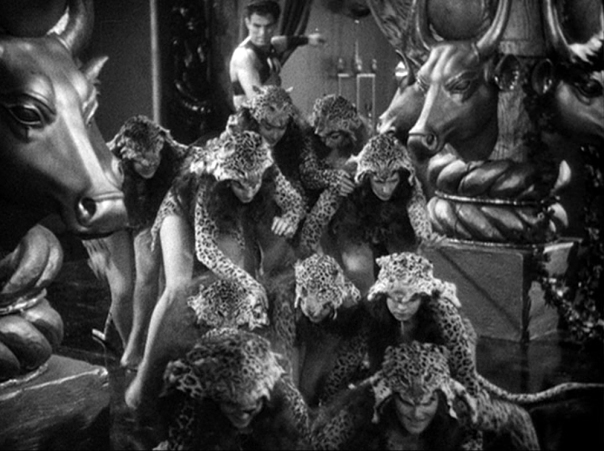
Supporting Colbert in the dual male lead roles is a terrific Warren William, as Caesar, and Henry Wilcoxon as Marc Antony, the man who would eventually woo Cleopatra. Warren William comes off as a little bit stiff as Caesar, although he shouts and pounds his fist and exhorts his armies with masculinity and refined authority. Wilcoxon, however, glowers and grimaces through his role of the more antagonistic Marc Anthony, a perfect foil for the leading lady’s radiant beauty. Caesar sees Cleopatra as something to be conquered through force, whilst Marc Anthony tries (and fails) to woo Cleopatra into Rome’s charms once he learns how beguiling she is. Both actors are outshone by Colbert, but it’s hardly a criticism more than a simple observation – neither actor is in the same class as DeMille’s glowing heroine, and try as they might she runs circles around them performance-wise. Most of the supporting roles are all well cast, including Eleanor Phelps as one of Cleopatra’s ladies-in-waiting, Arthur Hohl as Brutus, Lionel Barrymore as Fidius, and Leonard Mudie, as an ill-fated Pothinos, all give great support in roles that are introduced and despatched as quickly as they arrive.
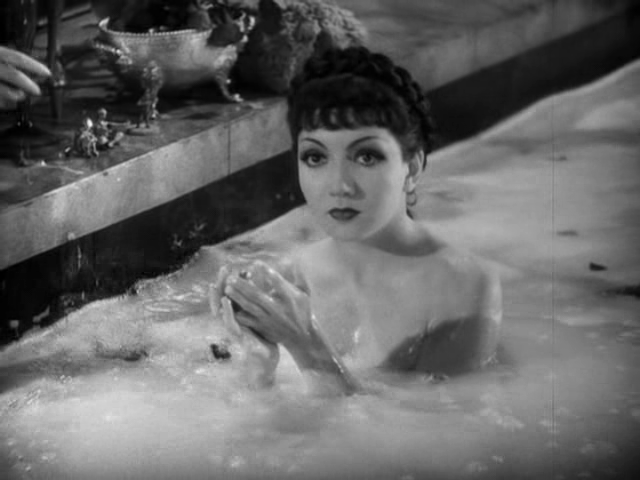
Chief among the film’s positives (aside from Colbert) are the massive art deco sets and DeMille’s use of them. Cinematographer Victor Milner’s deft use of lighting to create a sense of space in the sprawling sets; from the cavernous pillar’s of Cleopatra’s palace, the enormous wooden Egyptian barge upon which Cleopatra woos Marc Antony, and the lavish Rome set upon which Caesar meets his death on the Ides Of March, the film wants for very little in terms of grand operatic settings for this truly epic story. I admit, Cleopatra’s soundstage-bound settings are constrictive compared to later films due simply to a lack of far-distance visibility, but there’s no denying the film still looks “epic” in every sense of the word. The camera is used quite sparingly for a film of such value, with DeMille seemingly content to let the actors tell the story without visual flourish, and the editing (by an uncredited Anne Bauchens, apparently) is resolutely locked into the rigid style the director employs with his framing. To his credit, DeMille gives the film a solid sexiness – Colbert does her thing, but there’s a feeling of rampant desire lingering through every frame here, established by what appears to be a nude woman in silhouette strategically placed within the opening credits to raise an eyebrow or two.

One could mount an argument that Cleopatra doesn’t delve deeply enough into the historical facts amid the fiction of the real-life woman’s role in global affairs. The collision between the power-hungry might of Rome and the mythic, well-established Egyptian Empire has always made fascinating non-fiction study although only a few films have ever… er, conquered the topic with any proximity to reality. Cleopatra won’t tip the scales in our favour as it seems to rush through a potted historical legacy between the two ancient empires and the figures that bestrode them, offering instead of depth a sense of casual flirting with the political, social and religious climate of the day, none of which are offensive in their thinness but frustrating in that the backdrop is never more interesting than the foreground. The characters talk a lot of widescreen ideas, but the film’s focus on them at the expense of fleshing out the bigger story is one of the more glaring weaknesses I found with it.
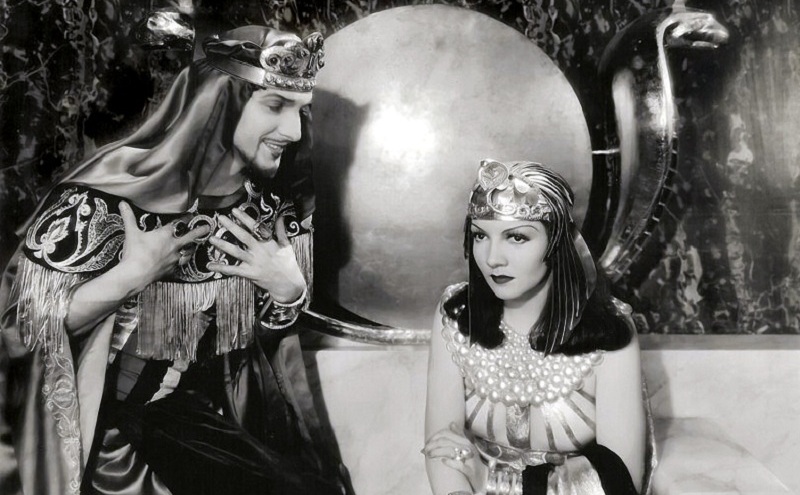
Cecil B DeMille’s Cleopatra is well told, delivers sexy, violent, intriguing machinations from its leading lady and fulsome hoary masculine toxicity from its leading men, both of whom mount a strong argument as to why they should love Cleopatra at the expense of all else. Claudette Colbert is radiant in the title role, beautiful and sensual as hell whilst running circles around the men she encounters – as feminist icons go, few could argue against Cleopatra being an ancient defining version of one – and it’s obvious DeMille’s camera loves her. Splendid costume design, terrific production on sets (by designer Hans Dreier) and visual effects, not to mention Rudolph Kopp’s appropriately brassy (read: epic) score: the sum of the parts is a hugely entertaining piece of pop-culture reference material that’s been imitated, but rarely bettered, in the years since. Colbert’s Cleopatra is arguably more sensual than Liz Taylor’s rigid turn in the role (although nowhere near as European-sexy as Monica Bellucci’s in the French Asterix film Mission Cleopatra) and it set the visual template for the character on screen for generations. Cleopatra is a fun, effortlessly breezy and ultimately tragic take on the classic love-triangle story that works as popcorn entertainment and not as a historical document.

